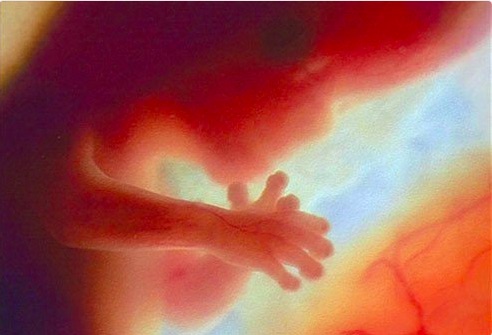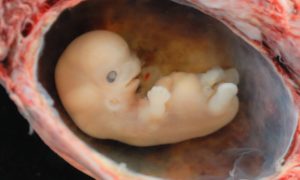British author Penelope Anne Watson wrote about her 44-year-long struggle with emotional trauma and mental illness after her abortion, which she calls “the biggest mistake of my life.”
Coerced into an Abortion
Watson was 18 when the doctor told her she was pregnant. She said, “He asked me what I wanted to do and, as far as I was concerned, there was nothing to do except have the baby. That was what I wanted.”
When Watson told her boyfriend about the pregnancy, he proposed. The couple wanted to marry and raise the baby, but both sets of parents were against it. The families were determined to keep them apart and wanted the baby aborted.
Watson said, “The reality was that there were no choices for us… but I still clung to the idea that I wanted to have my baby.”
She began knitting a jacket for the baby, and still has it to this day.
She aborted at 11 weeks, and “knew absolutely nothing” about fetal development. When she found out later, she felt “sick with shame and guilt.”
Pain and Cruelty at the Hospital
She had her abortion at a hospital and said there was “[n]o kindness. No words of reassurance… I felt sick, alone and more frightened than I had ever been in my life.”
As she was coming out of the anesthesia after the surgery, a nurse sneered at her, “Why are you crying? This is what you wanted, isn’t it?”
Still groggy, she couldn’t respond, but remembered wanting to scream, “No, it isn’t. It’s a million miles from what I wanted.”
Although Watson wasn’t told, there were complications. She remained in the hospital for several days, suffering intense physical pain, which she says was like labor. Nurses mocked her for crying until she left.
Post-Abortion Trauma and Mental Illness
At home, Watson says:
My head and my heart were now full of sadness, shame, guilt, fear and self-loathing…
I watched my friends having fun and just enjoying being young, and I so wanted to be like them, but this great gnawing ache in my heart wouldn’t go away. I tried so hard to put it to the back of my mind but, every day, there it would be when I woke up—sadness and anxiety…
Soon, I couldn’t even remember how I had felt when I was a carefree teenager.
Watson developed obsessive-compulsive disorder (OCD). She became consumed with fear that someone she loved would die, unless she carried out certain rituals perfectly. Watson believes her OCD was related to the abortion, her fear of God’s punishment, and her guilt.
A Desperate Desire to Have Children and A Hidden Medical Condition
Watson became obsessed with having another baby. She spent all her money on baby clothes and items, buying everything she thought a baby might need.
Having a child was a “driving force, my only ambition.” Eager to start a family, she married someone she didn’t love and knew wasn’t right for her.
Then, she discovered she had a condition called Uterus Didelphys, or two uteruses. Frequent miscarriages are a symptom of this condition. One study found that 65% of these pregnancies end in miscarriage.
Watson discovered that both the abortionist and her general practitioner (GP) were aware of her condition. In fact, the abortionist had joked in his letter to her GP that he entered the wrong uterus and almost sent her back to the ward, still pregnant.
Instead of waking Watson and informing her of the risks to future pregnancies, the abortionist committed the abortion and told Watson nothing. Had he told her, Watson said, the abortion never would have happened — her parents would’ve supported her, and she would have her baby.
Motherhood and Emotional Trauma
Watson and her husband divorced, and she remarried a man who was abusive. She stayed with him for years. She beat the odds, and had three children. But her first ultrasound was traumatizing.
She saw her fully formed baby at 12 weeks, and thought of the child she aborted at a similar age.

A preborn child at 12 weeks gestation.
The ultrasound made her worry that her aborted baby had felt pain, and she researched abortion methods. She said, “What I read will haunt me forever.” Learning about her baby’s violent death caused more trauma. (Read more here about research showing that the ability to feel pain likely develops sometime during the first trimester.)
Watching her daughter grow also stirred up pain:
It was a joy to watch her developing every day, but never far from my mind was my first baby and I couldn’t help but imagine it doing the same things … I wondered so much as I delighted in watching my little girl grow…
[T]hat wondering has never left me and even now I can look at my grandchildren and wonder what my first baby’s children would be like.
Years of Emotional Pain and Regret
Watson said even 20 years after the abortion, “my grief and longing for that baby were as fresh and raw as they had always been and I found it utterly impossible to forgive myself.”
She still had the knitting pattern of the jacket, and would take it out, hold it, and cry. But she kept her pain a secret from everyone.
Thirty years after her abortion, she sought treatment for her worsening OCD, but didn’t reveal her abortion. Medication improved her OCD symptoms slightly, but, she said, “there were no tablets to relieve guilt and shame, so it was far from a recovery.”
A Grandson Who Is Loved, but a Painful Reminder
When her adult son and his partner experienced an unplanned pregnancy, they chose life. Watson loves her grandson, but:
I very often think of my first baby when I look at Jake… He is a poignant reminder to me that, had I been stronger, my baby would also have gone from being an unexpected pregnancy and a frightening situation to being equally gorgeous and precious.
He or she would have been an adorable baby, a little one starting school, a teenager and now, my 49-year-old son or daughter. I feel so sad that I denied us both all those years of loving and being loved.
Forty-four years after her abortion, Watson found healing through Rachel’s Vineyard. She says she will always grieve her child, but is at peace. Watson still requires treatment for OCD.
Penelope Anne Watson “Why Are You Crying?” (2020) 12, 35, 35-36, 39, 40, 55, 79, 88, 114, 134, 144








